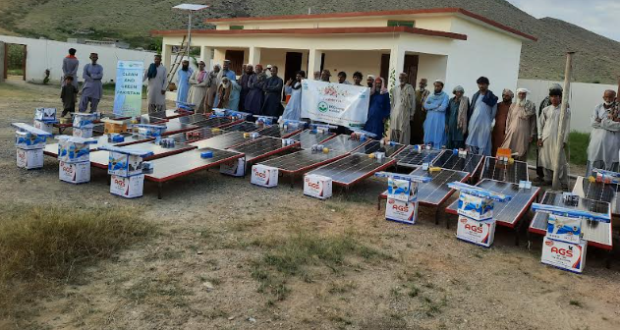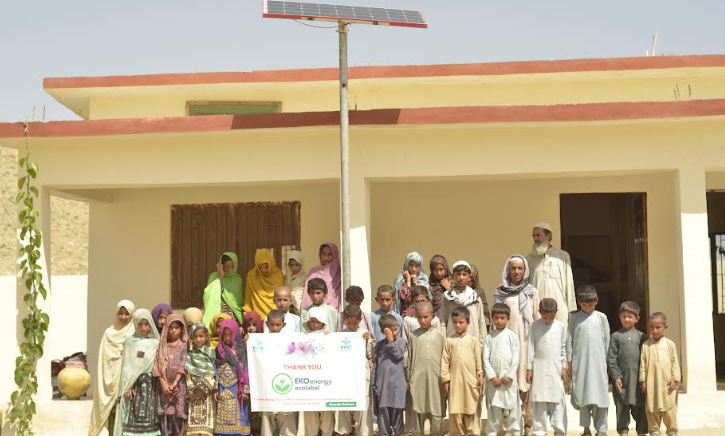By: Sultan Ahmed Shahwani
The backwardness of Balochistan almost in every sphere on life is no more a secret in the world. The lack of education, outdated tribal system, scattered population and the less economic opportunities have made the people of this province in poor and pauper which forms more than forty three percent of the total land of the country which led the NGOs to focus and intervene as the government is facing much difficulties to cope with all these problems single-handedly.
After a deep observation and a thorough contemplation, Health And Rural Development (HARD) Balochistan conducted a research and found the environmental degradation standing on its top. The depleted condition of underground water, the unchecked deforestation without reforestation and afforestation, pose environmental pollution, unchecked hunting of wild animals and absence of any planning to dispose off the city and hospital waste were the major problems affecting directly the natural environment. The gravity of the problem was further un covered when it was studied at rural level where the communities were badly entangled in the extreme clutch of poverty casting its shadow over the marginalized groups like children and women.
Realizing the intensity of the problem HARD Balochistan chalked out a well-conceived plan to find out and strike first at the main roots responsible for all these issues. The challenges were hard whereas the required wherewithal was insufficient and limited. The major advantage lying in favour of HARD team was the basic knowledge and information about the area, the nature of problems, the intimacy with the community and, last but not least, the acceptance of HARD Balochistan among the communities with better understanding. Priorities determined, action steps decided with viewing the available resources and it was specifically kept in mind as to how contemplate and then implement to get multi-benefits against limited resources.
The community general health was found poor and pestilential with special focus on girls and women health as they were fully exposed to all sort of health hazards. Working in crop-fields was making their health virulent due to hazardous pesticides. The handling of kerosene oil for lightening was making them inhaling poisonous gases and the smoke of wood and dung fire was directly affecting their respiratory system. Besides health, such problems were also giving to birth many social and economic problems. Kerosene oil was being used in lamps and being costly, it was unaffordable so the people used to use it as less as possible and switch the lamps off and go to bed just after having their night meal with disappearance of the dusk. HARD Balochistan started working on it and after collecting basic relevant data the multi-dimensional- intensity of the problem and its impacts studied. It came across that the problem is also hampering the economic empowerment of women and the education of the children as the non-availability of light during night compels them to go to bed without doing their homework and repeating and memorizing their day to day lessons.
The experts of the HARD team after gathering the basic information, started working on the proposal of a project helpful to find a environment and health friendly project with less investment but of multi-beneficial-importance. Unanimously solar project emerged in the thinking of the whole team and work began acceleratory. The work of the “Proposal of the Project” started transferring on papers with a deep thinking to ensure its workability with the possibility to yield the required results. Next problem was that of financing it. The title of the project chosen as “To reduce environmental impact and improve underprivileged children, women and communities health, education and social-economic condition and equity through provision roof-top solar energy system in Khuzdar, Pakistan”. The proposal submitted to EKOenergy Ecolebel – Finnish Association for Nature Conservation against their call for proposals to finance the project. After competing two competitive processes, EKOenergy Ecolebel was kind enough by showing generosity to respond positively at our proposal and then certain meetings/discussions the terms and conditions settled and finally, the mutual agreement of project signed.
HARD Balochistan decided the methodology and found it the first need of the project to introduce it in the society as to why it was prioritized and how it would benefit multi-purposely the targeted communities. Awareness remained in focus and the targets were also in mind while finishing one phase and entering into the second one of the project. HARD Balochistan was fully aware about the social limitations, norms and values of the concerned societies by showing great regard for the outcomes coming from the community through suggestions which went a long way to make the community to own our all efforts. The marginalized sections of the society were the prime focus throughout the process. The short-term as well as the long-term targets determined.
The project is leaving a long lasting results on people’s, wildlife and ecosystem. During the hot days of summer the school children were enabled to enjoy the breeze of solar fan and the same children were no more in trouble to do their homework and memorize their lessons in the lights lighted through solar energy. Now people have social gatherings to discuss their problems and participate in their events at night time. The women economically empowered to do Balochi embroidery to earn money till midnight because in day time they remain busy in household chores and outside work. The educationist and the health experts were interviewed with a view to ascertain the quantum of impacts on the health and education of the community and was encouraging to realize that they were there beyond our target and the results were more useful what was expected. We kept local media aware all the time to keep the people of the area know about us, our donor and our project as much as possible. the implementation of the project was going on side by side with deep analyzing and slight modification whenever and wherever needed.
The solar energy terminated the communities’ reliance on fossil fuels and it is improving the air quality and mitigating climate change in the project area, which is critical to protecting humans, wildlife and ecosystem. In addition, it stopped the rapid degrading of the economic condition of the people and the forests saved timely to provide shelter and food to the wildlife. The gaseous kerosene oil is no more hazarding the people health and people are getting much benefit with less investment. Since it was all a new concept and the technical know-how of the community was very nominal, so it was decided to impart the basic training to the community. The technical consultant/solar technician who had installed the solar energy projects at household stage, was engaged and trained 20 young men from the community about operational and maintenance techniques of the system. Basic tools and implements provided to the community and links with the experts were established to remove any major technical issue. The political representatives of the concerned communities were also taken on-board for any possible help in future. after the utter satisfaction of the project team, donor and community the project was handed over to the householders on due date. The communities and all the stakeholders appreciated and thanked EKOenergy Ecolebel – Finnish Association for Nature Conservation and their supporters for the funding towards protecting environment, lightening their lives and ending poverty through renewable clean and green solar energy system.
HARD Balochistan realized the fact that though the nature of the problems and rural Balochistan are complicated in their nature and sizeable in their size but they can be tackled with less time and less budgeting proved that all relevant facts are dig out timely.
Published in The Balochistan Point on December 31,2022
 Balochistan Point Voice of Nation
Balochistan Point Voice of Nation





